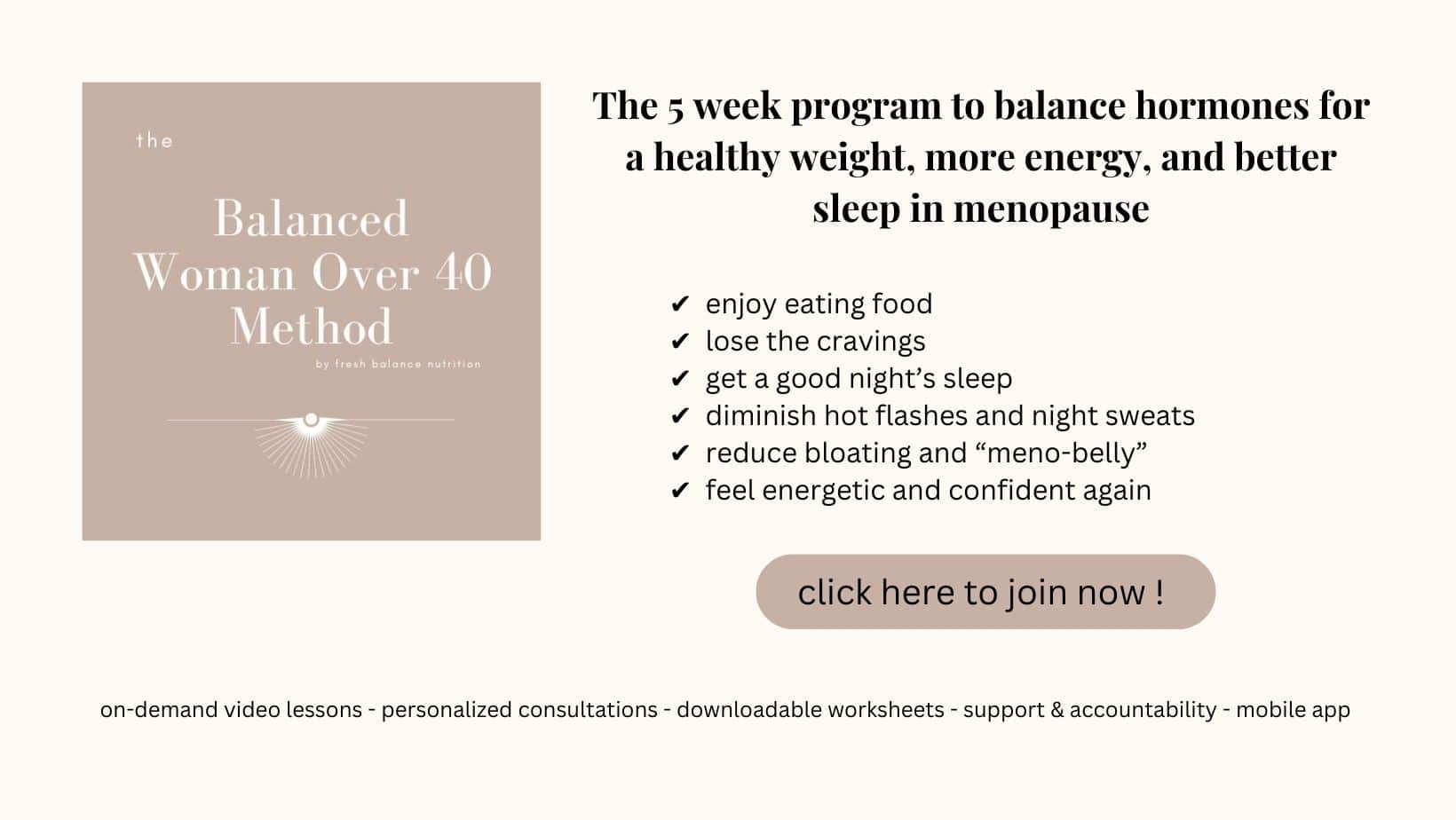Food and nutrition can play a major part in improving things like hot flashes, weight, and mood during the menopausal transition. A menopause nutritionist can help with the best healthy eating strategies for menopause.
Although many women talk to their doctor or GYN first, a dietitian nutritionist who specializes in menopause can offer personalized support, nutrition strategies, and lifestyle plans designed to help women manage their menopause.
What are some of the changes women expect at menopause that are related to nutrition?
Weight gain
As you get older muscle mass naturally declines, which slows your metabolism and makes it more challenging to maintain a healthy weight. Hormonal changes during menopause also increase the accumulation of visceral fat around vital organs in the belly area. As hormones shift in menopause you may have sleep disturbances and mood changes which can also influence eating and exercise habits further making maintaining a healthy weight challenging.
Cardiovascular disease
The risk of cardiovascular disease increases as estrogen decreases. It’s a fact that heart disease becomes the biggest health concern for women in menopause. Good nutrition can help manage heart disease, stroke, high blood pressure, and high blood cholesterol levels.
Low bone density
Without the support of estrogen we lose bone strength and density. Osteoporosis often results in fractures of the hips, spine, and wrists. Your best advice is to stay active, work in some weight bearing exercise, and choose foods that are good for your bones.
Digestion changes
It may not be obvious that there is a connection between shifting hormones and digestion. A decrease in digestive enzymes and stomach acid can cause symptoms. Women in menopause may notice gas and bloating. Slower digestion can lead to constipation.

Top recommendations from a dietitian nutritionist for menopause
Protein for menopause
As we naturally lose muscle in menopause our protein needs go up. In general, aim for 20 – 25 grams of protein in a meal. Proteins high in the amino acid leucine will stimulate muscle growth like declining estrogen used to. Eat foods like eggs, beans, and chicken.
Eat your veggies
Those colorful vegetables are not just pretty on a crudite platter. They are also full of fiber and nutrients that combat inflammation. Fiber helps make us feel full, feeds our gut microbiome, and helps balance cholesterol and blood sugar.
Choose carbs carefully
Our menopausal body doesn’t handle carbohydrates as well as it used to. That doesn’t mean we should cut them out completely. We just need to choose them strategically and watch portions. Nutrient-dense carbs like winter squash, fruits like berries and apples, and whole grains like quinoa are good choices.
Fats are special
As our hormones shift we become better at using fatty acids. One of the most important are omega-3’s which help fight inflammation and support heart health. Choose salmon, sardines, flaxseeds, and walnuts.
Skeleton support
We aren’t building bone any longer so it’s crucial to keep our bones strong. Both strength training and nutrition are ways to make an impact. Foods containing calcium, vitamin K, and vitamin D will support your bones. Add cottage cheese, yogurt, chicken, tofu, nuts, and leafy greens to your meals.
Toss the triggers
Sugar, refined carbohydrates, caffeine, and alcohol can set off symptoms like hot flashes and even anxiety. Create nutritious meal plans and set aside time to shop and prep meals that will help you feel good.

Another important point at this time when everything seems to be shifting – establish a positive relationship with food and your body. The recommendations above can help you feel more in control in order to nourish your body and calm your mind.
You may feel like you need some help to find your personal solution for good nutrition and a healthy lifestyle in this stage of life. As a Registered Dietitian Nutritionist and menopause expert, I can help you create a personalized plan that relieves symptoms, supports your body’s changing nutritional needs, and optimizes your health for years to come.








